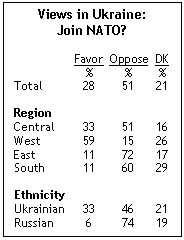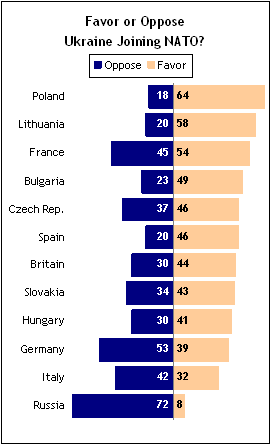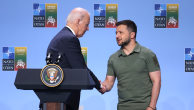by Kathleen Holzwart Sprehe, Research Associate, Pew Global Attitudes Project

Ukraine’s new governing coalition recently announced its intention to pass a law against joining military alliances, which will fulfill Ukrainian President Viktor Yanukovych’s campaign promise to prevent Ukraine from becoming a member in NATO. The new president’s opponents in parliament argue that this new strategy may result in pushing Ukraine back into the Russian “sphere of influence” and out of the European fold.
However, Yanukovych’s move to ban Ukraine from joining NATO is not without a base of public support. A September 2009 survey by the Pew Research Center’s Global Attitudes Project, found that half of Ukrainians (51%) opposed their country’s admission to NATO, while only 28% favored such a step. Moreover, given the opposition to membership, it is not surprising that about half of Ukrainians (51%) gave NATO an unfavorable rating.

Views of membership in NATO vary by ethnicity and region. Ethnic Russians (74%) were far more likely to oppose admission to NATO than ethnic Ukrainians (46%). In terms of regional groupings, respondents living in the East (72%) and South (60%) — where the percentage of Russians tends to be higher than elsewhere in the country — were more likely to oppose joining NATO than were those living in the Central region (51%). And in the West a majority (59%) favored their country becoming part of NATO.
Outside of Ukraine, many European publics supported the country’s entry into NATO. Majorities in Poland (64%), Lithuania (58%), France (54%) and nearly half in Bulgaria (49%), Czech Republic (46%), and Spain (46%) favored Ukraine joining NATO. However, Germans and Italians disagreed — 53% in Germany and 42% of Italians opposed Ukraine’s membership in the military alliance.
The strongest opposition emanated from Russia, where more than seven-in-ten (72%) opposed Ukraine’s admission into NATO.
Closer Ties for Ukraine and Russia?

Just one day after the governing coalition’s declaration of opposition to NATO membership, Russian President Dmitry Medvedev signaled his support by announcing a visit to Ukraine in May. Indeed, a closer relationship with Russia is likely to be well received by many Ukrainians. The Pew Research survey found that nearly half (46%) of Ukrainians said that Russia is a good influence on their country, and nearly six-in-ten Ukrainians (58%) cited Russia as their country’s most dependable ally
More recent polling in January 2010 by the Kyiv International Institute of Sociology (KIIS) found Ukrainians expressing an overwhelmingly positive view of Russia — more than nine-in-ten (93%) said they had a good attitude towards Russia. When asked about what they would like to see for their country’s relationship with Russia, two-thirds (66%) believed that the countries “should be independent, but friendly states — with open borders, no visas and customs.” Another 22% of Ukrainians believed that the countries “should unite into one state.” Few Ukrainians (8%) wanted relations to be “the same as with other countries — with closed borders, visas and customs.”
However, Ukrainians still express some reservations when it comes to closer ties with Russia — especially on the issue of energy dependence. In the fall 2009 Pew Research study, more than seven-in-ten (73%) Ukrainians said they are worried about being too reliant on Russia for their energy needs, up from 63% in 2007.




